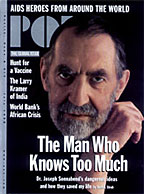 Fifteen years ago this month, I profiled Dr. Joseph Sonnabend for the cover of POZ. Check it out for a good perspective on some of the epidemic’s earliest and most important history.
Fifteen years ago this month, I profiled Dr. Joseph Sonnabend for the cover of POZ. Check it out for a good perspective on some of the epidemic’s earliest and most important history.
In those early years, I was insistent that our cover almost always be a profile of someone with HIV. Joe was only the second person on the cover who wasn’t known to be HIV positive; the first was Elizabeth Taylor.
I wish every person with HIV enjoyed the benefit of Joe’s care. I’ve never met a former patient of his who view him in anything less than heroic terms.
He’s retired and living in London now, composing music and caring for an ill sister. Occasionally he blogs for POZ, most recently with a reflection on the 30th anniversary of the introduction of “safer sex.”
One cannot adequately understand the epidemic without understanding the work and role of pioneering clinicians, researchers and advocates like Joseph Sonnabend (he was all three), many of whom remain inadequately recognized for the lives they saved.
If we had paid attention to what they had to say in the early years, I have no doubt but that the epidemic would be vastly smaller today. We, as a community, are practiced at identifying all sorts of people and institutions--from Ronald Reagan and Ed Koch to government bureaucrats, the pharmaceutical industry, politicians and religious zealots, etc.--whose actions, or inaction, in those early years so dramatically accelerated the epidemic.
We haven’t been quite as diligent in reviewing the leadership of those who were our friends and allies and recognizing that we made many mistakes. The purpose isn’t to blame, but to understand. What could the LGBT leadership--which was the de facto AIDS leadership--have done differently in the early years? What do we know now was a mistake? What do these things mean for future epidemics or for addressing the HIV epidemic now?
Advertisement
Advertisement
Advertisement







5 Comments
5 Comments